Posts Tagged ‘Burma Partnership’ (399 found)
No More Than a Semblance of Freedom of Assembly, Association and Expression
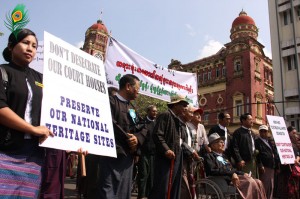 Like many of Burma’s other reforms including the easing of restrictions on media, there is a darker side to the semblance of freedom of assembly, association and expression that has recently been commended in Burma.
Like many of Burma’s other reforms including the easing of restrictions on media, there is a darker side to the semblance of freedom of assembly, association and expression that has recently been commended in Burma.
President Thein Sein’s office has been urging ministries to remove some 4,000 people remaining on the blacklist. However, some returning exiles have been asked to sign agreements that they will not do anything that could “harm the state.” The agreement says that exiles can repay the government’s “generosity” by avoiding actions that would disrespect the government and not participate in actions or publish anything that would harm the country’s stability, which hark back to language used by the military regime.
Within the country, lawyers, activists, farmers and local villagers have been protesting on a range of crucial issues including land confiscation, mining projects, electricity shortages, the preservation of cultural heritage buildings in Rangoon and the need for nationwide peace. Those who speak out on issues that are sensitive to the government are detained, charged or threatened by authorities. One of the biggest cases at the moment is that of the thirteen organizers of the peace protest on 21 September who are facing court cases in 10 different Rangoon townships for protesting without permission. They are required to appear at court hearings nearly every day and must inform the authorities if they plan to leave Rangoon […]
New Lending Must Address Challenges on Burma’s Road to Development
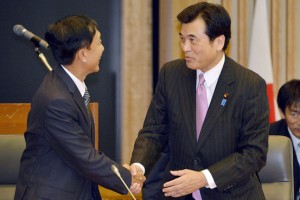 On 11 October, Japan announced that it would be resuming loans to Burma. It also hinted that it will assist the heavily indebted country in clearing its arrears and establishing good financial standing with international financial institutions, such as the World Bank and the Asian Development Bank.
On 11 October, Japan announced that it would be resuming loans to Burma. It also hinted that it will assist the heavily indebted country in clearing its arrears and establishing good financial standing with international financial institutions, such as the World Bank and the Asian Development Bank.
Japan will be forgiving US$3.7 billion or about 60% of the total $6 billion debt Burma owes; it is also planning to use bridge loans by Japanese banks to help clear Burma’s $900 million of arrears with the World Bank and the Asian Development Bank. Japanese Finance Minister Koriki Jojima stated, “Japan is planning to resume its full program in Myanmar with yen loans to help support Myanmar’s sustainable economic development…at the earliest possible timing next year.” He further explained that Japan’s development priorities in Burma would focus specifically in the areas of electricity and road rehabilitation, rural development and improvement of port facilities.
At this moment in time, Burma’s re-entry into the world economy, specifically the ability to take loans from institutions such as the World Bank, the Asian Development Bank and Japan itself, carries great risk. The type of projects to be funded, the rate of investment, the sectors in which investment will take place, the presence of monitoring mechanisms, and the decision-making process are just some of the factors that will determine the long-term outcome of international financial support […]
Not in Theory, Not in Practice: Freedom of Assembly and Association in Burma
The rights of peaceful assembly and association in Burma are fragile at best. The Burma government has enacted reforms to address this gap in human rights protection. Sadly the reforms are lacking and citizens are regularly denied any semblance of protection in relation to international human rights standards.
The Unlawful Associations Act1 and the NGO Registration Law haven’t been repealed; these remain large obstacles if Burma is to have freedom of assembly and association […]
• • •Burma Groups Release Concerns and Recommendations on Peace Funds
Burma’s ethnic community and civil society organizations released a position paper today welcoming peace fund initiatives but expressing concerns and recommendations to encourage the funds to support the country’s nascent peace process.
“There are many elements that successful peace funds must include, namely inclusive consultations, engagement with full organizations rather than individuals, equitable natural resource management and land rights, and addressing anxiety over the return of refugees and internally displaced persons,” described Paul Sein Twa […]
• • •Mining, Repression and Imprisonment, an Uncertain Future
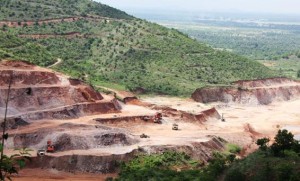 Burma has been internationally praised for moving in a more democratic direction recently. Sadly for many citizens these changes are a world away. Their interactions with the Burma government are characterized by the same repressive, corrupt, strong armed tactics that made Burma an international pariah for decades.
Burma has been internationally praised for moving in a more democratic direction recently. Sadly for many citizens these changes are a world away. Their interactions with the Burma government are characterized by the same repressive, corrupt, strong armed tactics that made Burma an international pariah for decades.
In the Letpadaung mountains, huge amounts of land have been forcibly confiscated by the government, environmental degradation has occurred and a policy of arrest and detention of peaceful protestors has been implemented. The Monywa Copper Project is located in central Burma’s Sagaing Division with four large deposits: Sabetaung, Sabetaung South, Kyisintaung and Letpadaung. The project covers almost 8,000 acres of land, the majority of which was forcibly taken from villagers.
Resource extraction has been the cause of some of Burma’s largest human rights violations and land confiscations. The Monywa Copper Project is the country’s largest mine in terms of recovery rates, production and revenue. Protests over the project and national attention have been growing, as have the number of arrests and detentions in association with those protests and land confiscation cases.
• • •“We Have Seen This Before”: Burma’s Fragile Peace Process
This paper seeks to outline and analyze the peace processes initiated by President Thein Sein’s government in the last year in both ceasefire and non-ceasefire areas […]
• • •Panel Discussion: The Role of Peace Fund Initiatives in Burma
On Monday 8 October, Burma’s ethnic community and civil society organizations will hold a panel discussion that will look at the possible impacts of peace funds on local communities and the prospect of nationwide peace, as well as other country examples that provide valuable lessons for Burma […]
• • •President Thein Sein’s UN Speech Disguises the Truth Behind Burma’s Reforms
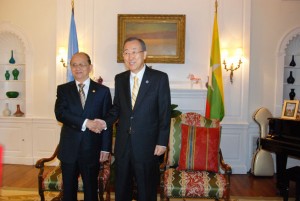 As President Thein Sein was busy at the UN General Assembly describing “the amazing changes” in Burma as “irreversible,” the Burma Army offensive in Kachin State continues unabated, hundreds of political prisoners remain incarcerated and peaceful protesters are detained and summoned to court. The reality of the changes in Burma is that they are merely tentative and minimal; substantive change is yet to occur.
As President Thein Sein was busy at the UN General Assembly describing “the amazing changes” in Burma as “irreversible,” the Burma Army offensive in Kachin State continues unabated, hundreds of political prisoners remain incarcerated and peaceful protesters are detained and summoned to court. The reality of the changes in Burma is that they are merely tentative and minimal; substantive change is yet to occur.
This reality is perhaps most keenly felt in Kachin State where more and more people are fleeing their homes as clashes continue. President Thein Sein addressed the Kachin issue by stating that the government’s Peace Negotiation Team and the Kachin Independence Army (KIA) are “working to further strengthen the confidence building measures.” Yet what confidence measures are these? Human rights violations are ongoing while more and more troops are being sent to the frontlines. The government is also blocking humanitarian aid. These are not confidence building measures. It is of no surprise that members of the Kachin community in the US staged protests at President Thein Sein’s visit and wrote an open letter to Thein Sein urging him to “stop the harassment, interrogation, and detention of innocent Kachin civilians by the local authorities.” […]
The Long Road to Ending Armed Conflict in Burma
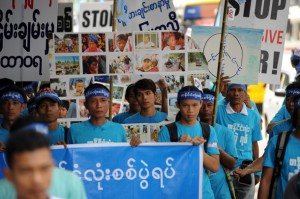 On 21 September, people around the world marked the United Nations’ International Day of Peace, a day that highlighted just how far there remains to go to achieve lasting peace in Burma.
On 21 September, people around the world marked the United Nations’ International Day of Peace, a day that highlighted just how far there remains to go to achieve lasting peace in Burma.
While Daw Aung San Suu Kyi was being feted on her first trip to the US in more than two decades, Kachin community members called on Daw Suu to do more for the people in Kachin State. As many as 90,000 people have been displaced due to armed conflict between the Burma Army and the Kachin Independence Army, and have little access to urgently needed humanitarian assistance.
Hundreds of protesters gathered in Rangoon on 21 September to call for peace in Burma, and especially in Kachin State. They wore blue headbands and carried signs reading “Stop Civil War” and “Justice Guarantees Lasting Peace” as they walked from City Hall to Inya Lake. Another group of protesters were stopped from traveling to Naypyidaw where they had planned to protest in front of the office of the Burma Army’s Commander-in-Chief; they instead joined the main group.
While authorities did not stop the main protest in Rangoon, the police later questioned 15 activists and have filed charges against them for violating Article 18 of the problematic Law Relating to Peaceful Assembly and Peaceful Procession for demonstrating without official permission. The activists say that they had applied for permission to protest and submitted all the necessary documents, but had been denied by authorities without being given any reason […]
Refugee Return Only with Consent, Safety and Dignity
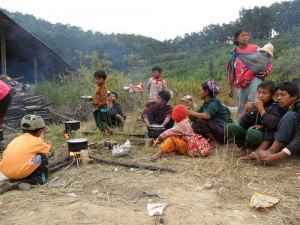 Anxiety and uncertainty has been building among refugees in Thailand’s camps regarding possible repatriation to Burma. While there are many actors who feel they have a major role in the decision-making of when and how this process will take place, none are more important than the refugees themselves. Thus, the release of a position paper by a group of Karen Community Based Organizations (KCBOs), many of whom work directly with communities inside Thailand’s refugee camps, is an important first step in making sure that it is those affected who determine the path that their lives will take.
Anxiety and uncertainty has been building among refugees in Thailand’s camps regarding possible repatriation to Burma. While there are many actors who feel they have a major role in the decision-making of when and how this process will take place, none are more important than the refugees themselves. Thus, the release of a position paper by a group of Karen Community Based Organizations (KCBOs), many of whom work directly with communities inside Thailand’s refugee camps, is an important first step in making sure that it is those affected who determine the path that their lives will take.
The position paper outlines pre-conditions for refugees’ return to Burma and the processes that must be followed once those preconditions have been met. The position paper is timely in that it was released the same week that the Thai National Security Council released a statement indicating that refugees will return within a year. Burma, the statement reads, “is clearing landmines along the borders, preparing to build shelters and other infrastructure… to be ready within one year.” […]
• • •








 All posts
All posts